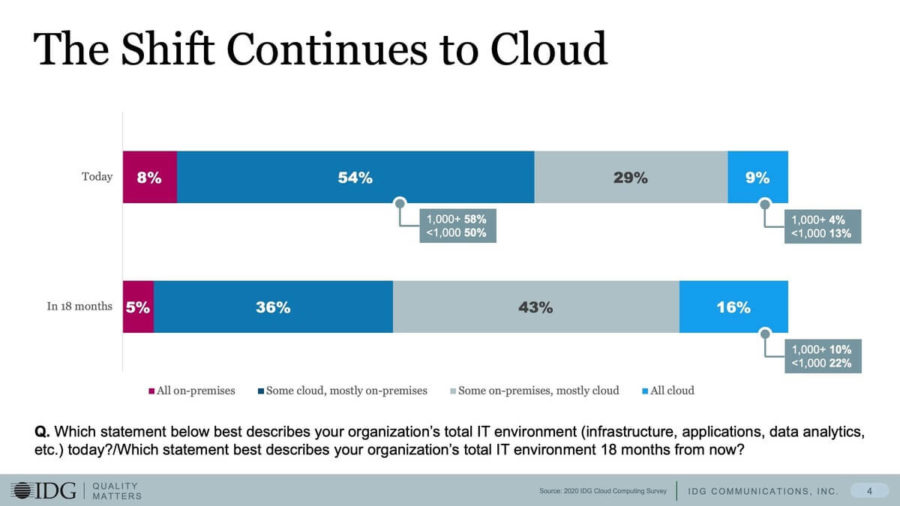The cloud computing revolution has had truly transformative effects over the last decade or so. More and more firms are increasingly reliant on cloud services and data centers, simply to operate from day to day. This has made life easier and more convenient for consumers, too, even those who don’t appreciate what an impact the cloud has had.
Prior to the cloud, businesses often had to go to the trouble and expense of running their own on-premises IT infrastructure, as well as covering the cost of in-house IT staff. With the rise of cloud service providers including Microsoft Azure, Google Cloud, and Amazon Web Services (AWS), these firms have been able to take advantage of the cloud instead. All you need in order to do so is a decent internet connection.
There are many types of cloud computing services. Three of the principal ones are software as a service (SaaS), infrastructure as a service (IaaS), and platform as a service (PaaS). There are also three general types of cloud infrastructure: public cloud, private cloud, and hybrid cloud (combining both public and private elements). Cloud computing is thus prized for its flexibility and accessibility.
Here, we’ll look at some of the most important advantages of cloud computing, from cost savings and data storage, to scalability and reduced downtime. We’ll also consider how RingCentral’s desktop and mobile app and its cloud contact center can help your business.
❓ Curious what it’s like to move to the cloud? Grab our eBook to learn how one businesses easily moved their contact center to the cloud and transitioned to remote work.
The benefits of cloud computing
There are numerous benefits to adopting cloud technology, which is why so many businesses—from corporate giants to brand-new startups—are embracing it with such enthusiasm. Whether you’re looking to cut your business’s carbon footprint or you need to protect sensitive data, cloud computing can help.
Let’s look at 10 of the most important benefits cloud computing has to offer.
1. Lower costs
As we’ve mentioned, prior to the advent of cloud computing, many businesses had to run their own in-house computing resources. This meant employing IT team members to run it, as well as taking direct responsibility for ensuring that sensitive information was kept firmly under lock and key.
Needless to say, all this came at a cost. Switching from in-house IT infrastructure to remote servers provided by third-party cloud platforms allows business to make potentially significant cost savings. Cloud providers are responsible for supplying the IT infrastructure; the costs of upgrades, new hardware, and software may also be covered by your contract.
2. Better customer experience
Cloud-based solutions can also enable businesses to deliver better standards of customer service. The customer experience is of vital importance today, and consumers have come to expect businesses to be much more attentive to their needs. Businesses that succeed in doing this are much more likely to establish long-term customer relationships.
RingCentral’s cloud contact center software and Engage Digital platform can help your business meet (and exceed) customers’ expectations. Engage Digital lets you consolidate all your social media conversations into one easy dashboard:
The contact center platform routes your inbound calls to the right agent at the right time, boosting customer satisfaction and first-call resolution rates. Better still, it can also be fully integrated with customer relationship management systems.
It also allows agents to make more effective use of customer data collected in the IVR. Agents can access relevant data, enabling them to meet the needs of customers without having to make repeated requests for data to other members of the team.
3. More flexibility
In the modern world of business, flexibility is a crucial watchword. The needs of clients and customers are changing all the time, and businesses need to be adaptable enough to adjust. Cloud computing can provide the extra flexibility that can give firms a crucial competitive advantage.
With cloud computing, firms can free up resources (including both financial and human resources) for deployment in other areas. This allows them to devote more attention to satisfying clients and customers, rather than managing and maintaining their own IT resources.
Cloud-based services are themselves celebrated for their flexibility. If, for instance, you need extra bandwidth, a cloud provider will be able to supply you with this instantaneously without the need for you to overhaul your IT infrastructure.
4. Better communication and teamwork
Communication is crucial to success in business, and the cloud has made it a great deal easier to collaborate with colleagues and clients all over the world. The nature of collaboration has also changed a lot over the last decade or so. It’s much more common to work with colleagues in different parts of the world, for example.
With cloud computing, this kind of collaboration is made much simpler. Colleagues, clients, and third-party contractors or consultants can all work in the same files, all accessible via the cloud. It’s also far easier to share relevant records with, say, financial advisers and accountants. This makes a whole host of processes smoother.
RingCentral’s app for desktop and mobile can enhance collaboration by fostering better communication. It brings team messaging, business phone calls, and video meetings together under one roof:
5. Reliable continuity
Downtime is one of the great fears of modern businesses. All kinds of things can put businesses’ IT infrastructure out of action—from power cuts to natural disasters. Businesses, therefore, need to ensure that adequate arrangements are in place to assure reliable continuity, come what may.
With cloud computing, all your data is stored in the cloud, which means that you should be able to access it so long as you have an internet connection. No longer are you reliant on temperamental old IT resources. With the cloud, you should be assured of business continuity wherever you are.
6. Strong security
Data security has been one of the hot topics of recent years, with tougher regulations introduced in order to ensure more robust protection. Even now, a lot of firms still worry that migrating to the cloud may leave their data less secure, and more at risk from prying eyes.
In fact, cloud providers go to great lengths to ensure that data is kept secure, reducing your chance of getting hacked. They are tasked with protecting data from being accessed by unauthorized users, and this is something they do very effectively using robust encryption. Cloud providers also usually give individual clients the freedom to determine their own security settings and restrictions.
7. Easier mobility
In this age of working from anywhere, mobility is paramount. Today, it’s possible to be far more flexible in terms of our working arrangements than before. Now, we’re working in all sorts of different locations: in offices all over the country and overseas, at home, in the coffee shop, in the library, or maybe outside in the garden.
Cloud computing has greatly assisted this trend towards more flexible working. It enables employees to access the files they need, wherever they happen to be, thus allowing them to work. Again, all they need is an internet connection. With RingCentral’s desktop and mobile app, you can stay in touch with your teammates and also clients, wherever they are.
8. Disaster recovery
One of the problems of being reliant on old and temperamental legacy IT infrastructure is that it’s likely to be more prone to failing. These technical failures can do a good deal of damage to a business, as well as running the risk of irretrievable data loss.
Cloud computing ensures that disaster recovery is much easier than it might otherwise be. This is because vital data is stored off-site in third-party data centers, thereby making it easier to retrieve in the event of unscheduled downtime.
9. Easy scalability
As your business changes and expands, so too will your IT requirements. Alternatively, it may be that you’ve had to scale down your operation, and with it your IT storage needs. Cloud computing provides easy scalability, allowing you to upscale and downscale as your circumstances change.
Your cloud provider will handle this for you, leaving you free to do more important things.
10. Automatic updates
Businesses that run their own IT infrastructure also have to handle software updates, so that any security vulnerabilities are patched up and that the technology they’re running on is up to date. Cloud providers generally take responsibility for this themselves, saving their clients the time, expense, and energy:
How RingCentral can help
If you want your business to join the cloud computing revolution, then RingCentral can help. With RingCentral’s cloud-based inbound contact center software, you can connect customers to the right agents—wherever those agents are—through skills-based routing. You can also optimize agent schedules to minimize customer wait times.
RingCentral’s desktop and mobile apps, meanwhile, offer diverse types of functionality all in the same place. Including cloud-based business phone calls, team messaging, and video meetings. In other words, everything you need to keep your team connected and productive, no matter where they’re working from!
Originally published Feb 17, 2021, updated Jun 18, 2024







